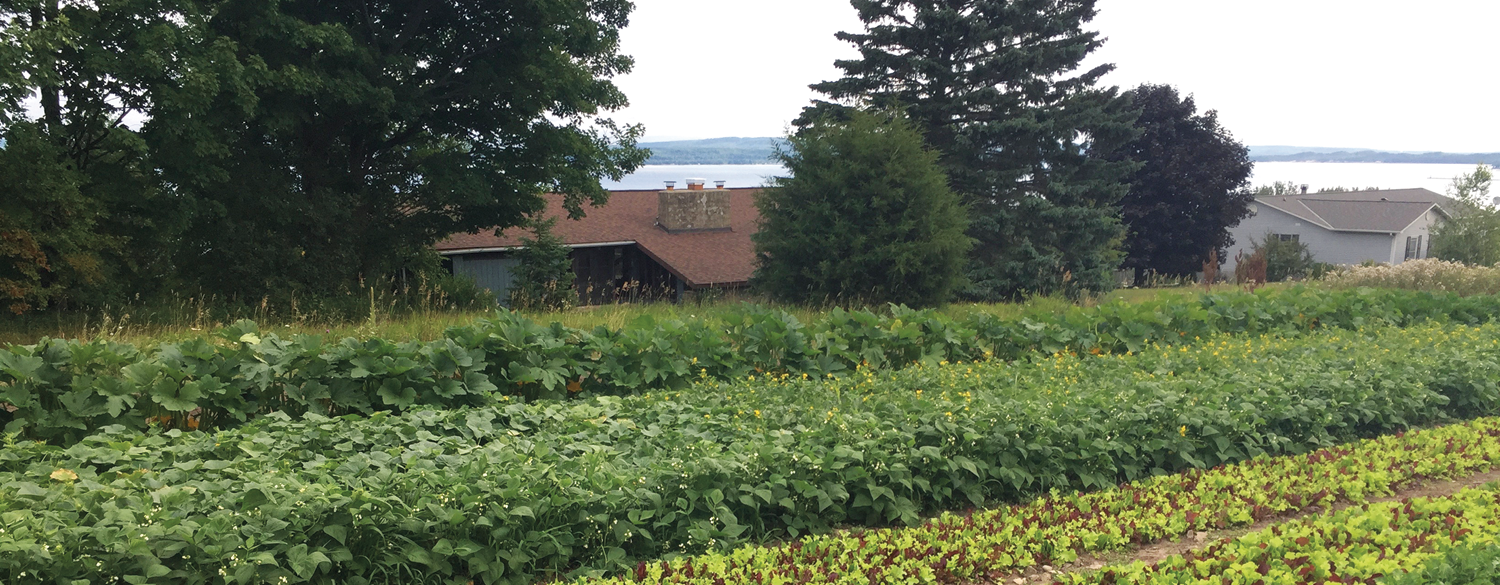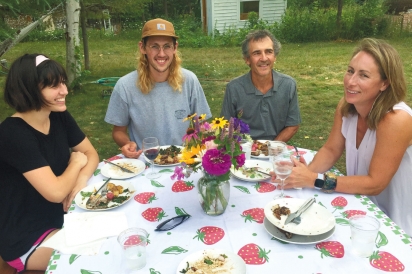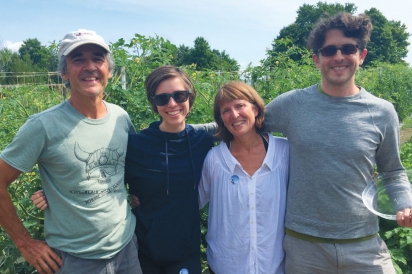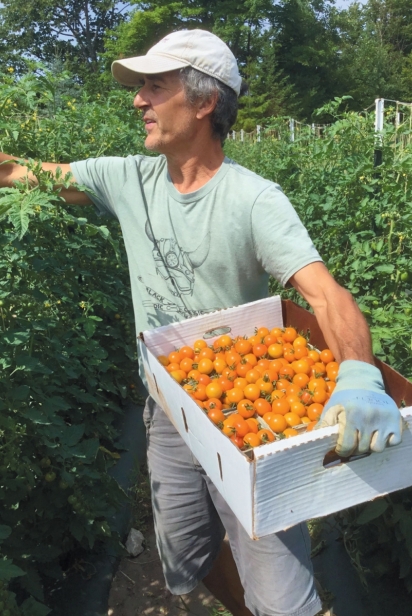Farming and the Art of Letting Go
On a windy ridge above the sparkling waters of Lake Michigan, sustainable farming pioneer Mike Everts muses about the origins of his 30-year-old vegetable farm, which serves as inspiration for his catering business.
“We’re named Blackbird Gardens. We live on Blackbird Road. And there was a Odawa tribal leader named Andrew Blackbird.”
Mike’s sense of place is strong. From harnessing the microclimate created by the influences of the nearby waters to learning the special soil amenities required by a now-long-gone neighboring cement factory, Mike has navigated a long and slow learning curve to the art of farming on his Petoskey acreage. But along with the rewards have come challenges.
THE JOURNEY
Mike, now 57, says it took many years for him to draw the connections between his early childhood and what has turned into a lifelong passion. His Northern Michigan-rooted family moved to Edgewood, Maryland, while his veterinary-degreed father served in the military towards the end of the Vietnam War. He describes a huge wilderness area where his dad tested military ordnance but also spent time hunting and fishing—reaping the incredible bounty of the Chesapeake Bay, a coastal brackish marshland rich with “all kinds of delectable edibles,” Mike remembers.
“We would go out and catch striped bass and blue crab and flounder and coastal snapping turtles and alligator turtles.” And his parents loved to party with their food, Mike recalls. “As a kindergartener I was witness to a lot of really excellent seafood and big parties with a lot of beer drinking and eating of crab cakes and fish fries.”
The tradition continued when the family moved back to Michigan after Mike’s dad’s military service ended and his veterinary career began—along with his pursuit of gardening. Then Mike’s dad would pack a Radio Flyer wagon full of seasonal produce from the bumper crop in his vegetable garden and send a young Mike door to door in their neighborhood to sell. Mike says that it was perhaps not the best imprinting for his early economic life, but nonetheless foreshadowed things to come.
Mike’s food journey began in earnest as an art student in San Francisco working at the iconic Inner Sunset Community Food Store. He says he tasted salads made with organic lettuces and dry-farmed tomatoes for the first time, which turned his taste buds on to “real food.” When he moved back to Petoskey in the late ’80s as a self-described “young, idealistic person,” he felt that what was lacking were organic produce growers. Drawn to that, he bought approximately three acres of family-owned land from his grandmother, Ester Parsons, and began to farm.
For the first ten years, Blackbird Gardens grew pumpkins and winter squash, which Mike marketed at a roadside stand with an honesty jar. He also began his cooking career in earnest, working at the Grain Train food co-op baking granola. Serendipitously, Jim Gillespie, his boss at Grain Train, was also the executive director of Bliss Fest, and recruited Mike to do music festival outreach by running the food booths for both Bliss Fest and the Wheatland Music Festival.
But 25 years of festival cooking along with his work on the farm caused burnout. He says, “As I got close to 50, I thought, ‘Do you want to live to be 70?’ Doing the festival cooking was an exhausting three-week process, so I let that go.” He also let go of the labor-intensive CSA program he ran for eight years on the farm. Having lightened his load, he decided to focus on weddings instead.
So began his catering career, which in combination with farming cemented his current dual-career focus. “The basic idea was always to have this market garden and be actively involved with the local food community.” He adds, “I was doing farm-to- table before I ever heard ‘farm-to-table.’” His mission was to incorporate at least 80 percent locally grown and made foods in his cooking, much of which he would grow and make himself.
But there is more to Mike’s journey than his resume. In 2004 he made a trip to the Terra Madre convocation in Turin, Italy, where 5,000 producers and food activists from 130 countries gathered to celebrate Carlo Petrini’s founding of the Slow Food movement. It made a profound impression. It opened his eyes wider to the realization that as we continue to industrialize our food system we’re not only losing varieties of vegetables that have evolved for hundred of years but we’re losing culture and people’s ways of life. For that insight he was influenced by Ojibwe Nation member Winona LaDuke, a renowned environmentalist, economist and writer. And perhaps his biggest revelation came from a breakout session on biodynamics. There he learned that the foundation of the farm is the compost.
“For the organic vegetable grower, the compost pile is that giant foundation culture that you’re making,” Mike explains. “And I get just as excited about a great compost pile as I do about a great loaf of bread because I know what the results can be.” He also made the connection between “culture” being an all-important aspect of society and “culture” as the microbial environment that transforms foods and makes them last longer. This has led to his deep dive into fermenting vegetables to make kimchi and habanero carrots, among other lacto-fermented veggies, a staple of his catering as well as farm market wares.
The next big lesson he learned along the way was the efficiency of scale.
LESSONS FROM THE FIELDS
It’s Monday, which is a planting day on the farm. It’s a comfortably mild mid-August afternoon with the warm temperatures mitigated by a breeze blowing in from the bay below, visible from the steeply sloping fields. Summer flower beds are glowing: edible, vibrant orange nasturtiums, purple echinacea and blue borage blossoms as well as more traditional cut flowers attract swarms of bees and butterflies. Nine long rows packed with 800 individually trellised heirloom tomato plants brimming with multi-colored tomatoes along with row after row of various greens and squash testify that much planting has already been done. Mike and his crew are now in their second and sometimes third plantings of their seasonal crops.
Mike’s experimentation with downsizing his operation in order to take the farm to a higher level began about eight years ago. As a seasoned farmer, he’s concluded that cutting back on farm production—this year farming about half the acreage of what he did last year but growing a larger mix of vegetables—makes economic sense.
“My goal for this year is to run out of fresh food by the end of December and not go to those mid-winter markets.” He hopes that this will give him the time he needs for winter organizational work and building his infrastructure. And also much-needed farmwork recovery time. “I’m a ski bum in the wintertime,” he laughs. He claims that this is also the reason that while he rigorously follows organic growing practices, his farm is not certified. He says, “I just never get it together to do that organizational work. But we use compost, we use cover crops, we use soil testing. We are very sparing about any of the either biological or plant-based organically listed materials we use.”
Downsizing also has its advantages for maximizing labor. Mike describes his two-man team as “amazing” this summer. He credits it with giving him the time to weed, to heal the irrigation leaks and to side-dress things with compost when needed. “Things are getting done to a much higher degree.” He smiles as he continues, “We’re getting things clean-weeded with much less weed seed going back into the soils. So next year’s farm will be even better.”
Mike sees having good and consistent labor as being key to farming success—right up there with good compost. “You’ve got to have enough labor for this very labor-intensive work or your farm is just not going to shine. And our farm is shining this year.”
Chris Hipsher, 28, is a returning employee, whom Mike is also grooming as a business partner in an artisan kombucha startup business utilizing Mike’s on-site commercial kitchen and herbs and fruits from the farm. Chris plans on farming with Mike “as long as Mike plans on doing it.” Farm intern Wilson Ekern interjects, “Mike will never stop!”
Mike describes Wilson, who is 20 and just finished his freshman year at Carnegie Mellon University before joining Mike and Chris on the farm, as “just a positive guy who has a ton of energy.” Wilson describes Mike as a “very exacting boss with precise ways he wants everything done. But once that’s nailed, he recognizes when you’ve done good work and always is good with the praise that way.” Wilson chuckles, “Even when you do mess up occasionally, it’s never the end of the world, ’cause there’s always about 200 chances to do things right.”
Tuesday is a harvest day. Heirloom tomatoes are a highlight. Mike and crew prep for three weekly markets: Wednesday and Saturday markets in Boyne City and Friday market in Petoskey. Mike says he’s finally starting to have bigger days at the markets. “This is the time of year that the farmer gets paid,” he says. “This farmer, at least!”
And herein lies another challenge. Thanks to the growing popularity of the local food movement, as many as a dozen new vegetable farms have started up in the Petoskey area over the past decade, run by imaginative and hardworking young farmers that Mike says he greatly admires and often draws inspiration from. “You have to celebrate their success,” he says. But he’s struggled with the added competition for market sales. Part of the competition comes from the season extensions enabled by the use of hoop houses.
Mike explains that he hasn’t invested in hoop houses for several reasons: “One: I’m a very small farm and it’s very windy ridge and I just feel these regular 50–70 mph gusts that happen in November would wreak more havoc on hoop houses here than on other farms.” And he doesn’t like the aesthetic of how all that plastic looks. But he definitely feels the pressure. Normally, in addition to the added income his early August harvest of heirloom tomatoes brings, there would be a WOW factor about them at the markets. But now, with the advent of hoop-house tomatoes showing up at the markets as early as June, it’s just “Oh, there’s more tomatoes at the market.” Customer expectations have changed. “So everything changes with plastic,” he muses.
Mike says he realizes that, “I will never be the best farmer that I could be because I also have a catering company. And I’ll also never be the best chef that I could be because I’m also a farmer. But in the 30 years I’ve been doing this, I’ve learned a lot about food. And I have provided a lot of very excellent meals for people at their weddings. The big thing I have going for myself is that I don’t compromise. It’s not really about the money. I’m just doing this because it’s how I’ve always done it based on idealistic, youthful tendencies.”
Cornelia Dhaseleer, co-owner of Dhaseleer Events Barn, who shares a homestead farm and events center with her husband, Carl, in Charlevoix, agrees. She says that, “Mike is the epitome of authenticity when it come to raising food organically. He is a passionate and methodically meticulous teacher to his many interns and employees in field and kitchen.” Cornelia credits Mike with inspiring them to start their farm-to-table events business 12 years ago. “I count myself lucky to have been introduced by him to the world of growing veggies and turning them into delicious meals.”
Mike’s work harvesting his heirloom tomatoes is interrupted by a cheerful trio who’ve come to the farm unannounced to return a Pyrex pie plate from a wedding that he catered the weekend before. Jennifer Carroll, mother of the bride—and primary wedding planner—leads the way with daughter Shannon Carroll and son-in-law Craig Sinclair close behind. Jennifer says that the real reason for coming was to thank Mike in person for his efforts. Jennifer says it was “a shining example of what Northern Michigan weddings can be like if you find exactly the right caterer who understand how good the food is. It was a celebration not only of agriculture but also of the waters.”
Shannon, a documentary filmmaker who lives with Craig in Brooklyn, adds, “One of the best dishes was the walleye. There are a lot of fishermen in our family and everybody was just amazed by it—and were asking for the recipe.” Craig, originally from Winchester, England, explains that they are not always this effusive in praise. “This was a really special connection to person and the land.”
As Mike contemplates the future of local food over the next ten years, his advice to new farmers in the Petoskey area is to grow the food movement by diversifying it. “Look at all the different kinds of food that are being produced and try to pick something that nobody’s doing yet. And do that.”
Echoing intern Wilson’s insight that he will “never stop” farming, Mike adds, “I think I have a really great life. Because it’s a way that I can get out there every day and work for a better world. So I feel very fortunate— even though I don’t make much money—I love what I do. It’s also very challenging.” But Mike is a Taurus man, and he likes that challenge












